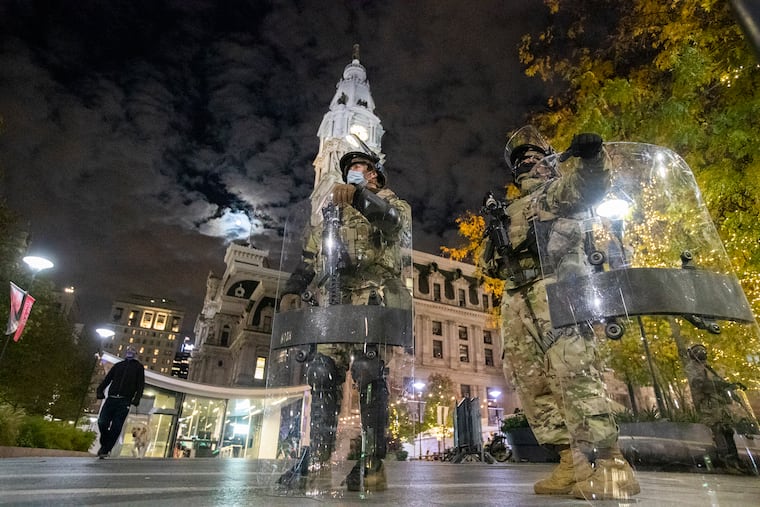Sending Pa. National Guard members to the Mexican border could put Pennsylvanians at risk
As a member of the Pennsylvania National Guard, I’ve agreed to put my life on the line to serve our country. But I am not willing to do so — nor have my life uprooted — for political theater.

Recently, the Pennsylvania Senate approved a resolution by State Sen. Doug Mastriano (R., Franklin and Adams Counties), which called on Gov. Josh Shapiro to send the Pennsylvania Army National Guard to the southern border in Texas.
“Pennsylvanians have an interest in protecting our nation’s southern border and preventing an influx of immigrants and illegal drugs from reaching our communities,” Mastriano said in a release.
I am one of the 15,000 members of the Pennsylvania Army National Guard and have been for more than six years. My unit was called up for the George Floyd civil unrest in Philadelphia and for the Jan. 6, 2021, insurrection response at the U.S. Capitol.
I know the role the National Guard should play, and I’ve agreed to put my life on the line to serve our country. But I am not willing to do so — nor have my life uprooted — for political theater.
State Sen. Mastriano seems confused on several key points, namely the purpose of the National Guard. The guard has specific purposes: providing trained units to defend the U.S. and its interests, and to protect life and property. This boils down to two actual missions: supporting deployments around the world (either active or reserve), and responding to domestic crises in our home states.
Sending Pennsylvania National Guard members to Texas is not an action in support of any crisis in our commonwealth. It also does not support the active or reserve component with any deployment.
National Guard members also have completely different full-time jobs, family and friend obligations, and — in many cases — full-time schoolwork to complete. Sending us anywhere instantly disrupts family life — and college semesters — for thousands of service members and their families.
Many National Guard members are full-time police, EMTs, firefighters, teachers, and doctors from our communities, and sending them out of state puts all Pennsylvanians at risk.
Most importantly, when any members of the National Guard are deployed, the state has fewer resources to react to actual emergencies within our borders.
I challenge anyone to argue that the benefits of supplementing troops on the southern border outweigh the risks of doing so to our state.
I signed up to serve my country, not to be a political thespian for the governor of Texas’ attempt to court favor and attention by vilifying people seeking a better life in this country. I am happy to deploy overseas to fight foreign enemies, I am happy to defend the Capitol from domestic enemies, and I am honored to assist those in need during disasters in my state and community.
What I did not sign up for is to be told by a state senator that I’ll have to miss a wedding anniversary, delay graduating college, miss the birth of a child, or pass over a promotion at work — all to go perform a function on the southern border the federal government already employs thousands of people to do.
I believe most Pennsylvanians agree with me, and not State Sen. Mastriano. Otherwise, more people would have voted for him when he ran for governor last year.
The border crisis is a customs and immigration issue. National Guard members are not a Band-Aid fix for every tough problem that requires more staffing, and we remember every politician who tries to use us in this way.
I am happy to serve my country during times of crisis, but the right tools should be used for the right problems. The National Guard is not a magic, “problem-be-gone” workforce for any state, and I urge Gov. Shapiro to ignore anyone who believes otherwise.
Cam Pursel is a National Guard member who’s lived in Philadelphia since 2018.